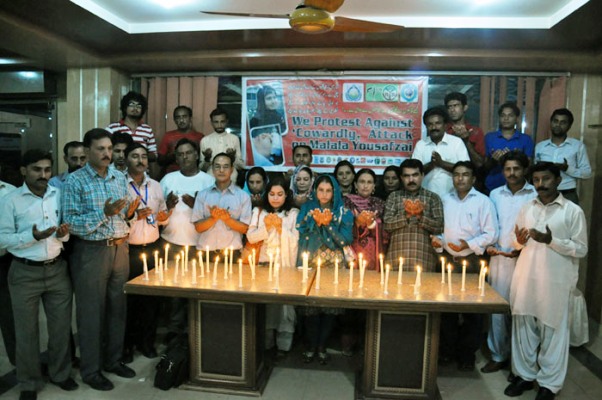![]()
The Words of the Younas Family
|
|
The Words of the Younas Family |

When? October 12-19
Where? Multan, Pakistan
Contact: Marcus
Younas
Multan, Pakistan -- The Society for the Promotion of Education and Awareness in Pakistan organized a Religious Youth Service project in Multan in the central Pakistan state of Punjab from October 12 to 19 to promote volunteerism and intercultural exchange. Thirty youth leaders from Pakistan were joined by youth leaders from other South Asian nations to spend a week as a multiethnic, multi-religious, and multicultural community engaging in various service-learning activities and providing safe drinking water and sanitation for Hindu slum dwellers.
Participants joined other young people in Pakistan and other parts of the world in holding a candlelight prayer vigil for the recovery of Malala Yousufzai, the 14-year-old Pakistani student shot in the head and neck on October 9 as she was returning from school, defying a Taliban ban on education for girls.
A steering committee of Muslim, Hindu, and Christian leaders visited religious and community leaders, schools, and the media to promote broad student participation in aspects of the project. The initial three days included background information about the leading faith traditions of the region and provided a rich opportunity religiously diverse youths to dialogue with one another about the ways their traditions can inspire them to serve and to partner in projects that improve their communities. Prayers from different faith traditions, readings from holy books, music, simple rituals, and other forms of worship reflected South Asia's rich "unity in diversity." These were interspersed throughout each day to cultivate a sense of shared hope and celebration that are essential to interfaith cooperation.
The service activities at a Hindu slum community included constructing a borehole to provide access to clean drinking water, constructing two toilets, cleaning the waterways, and removing debris along the streets and public facilities. A steering committee from the community will oversee maintaining the new facilities.
A student peace festival is scheduled at the Multan Arts Council Building. Students from various educational institutions will be invited to present music and dramatic performances and give speeches. They will also take part in an indoor games competition. The goal of the program is to promote the message of interfaith harmony and peace-building.
A closing ceremony will offer Pakistani participants and people from other parts of Asia to reflect on their experiences and give feedback. It is hoped that this project will cultivate a network of young peacebuilders who can promote understanding and friendship across religious boundaries in their communities and their nation.
For more information contact:
Marcus Younas (Executive Director)
Society for the Promotion of
Education and Awareness-Pakistan
House No. 24, La Salle Colony,
Naqashband, Multan 60000, Pakistan
NOTE: Multan is a city in the Punjab province of Pakistan, near the border with India. It is Pakistan's third largest city by area and its fifth largest by population. The city is located on the banks of the Chenab River in the geographic center of the country. Multan is known as the City of Sufis or City of Saints and Madinat-ul-Awliyah because of the large number of shrines and Sufi saints from the city. The city is full of bazaars, mosques, shrines, and ornate tombs. It is the birthplace of Fariduddin Ganjshakar, popularly known as Baba Farid, an early Punjabi language poet. The city has become an influential political and economic center for the country, with a dry port and excellent transport links. It is famous for its crops of wheat, cotton, and sugar cane as well as mangoes, citrus, guavas, and pomegranates.
Pakistan is about 97 percent Muslim, with Christians and Hindus each comprising approximately 1.6 percent of the population. Although it once boasted a huge Hindu population, there are now only 1200 Hindu registered voters in Multan. All are Balmiki Hindus and are Dalit, or "untouchables." They live in various clusters within the city, the largest of which is near the railway station. Here there are about 100 Hindu houses where families live in miserable conditions without the basic amenities of life. Although they are registered as Hindus, they don't wear the distinctive vermilion marks or saris, and most have dual names, e.g., Barkat Ali and Tara Chand.